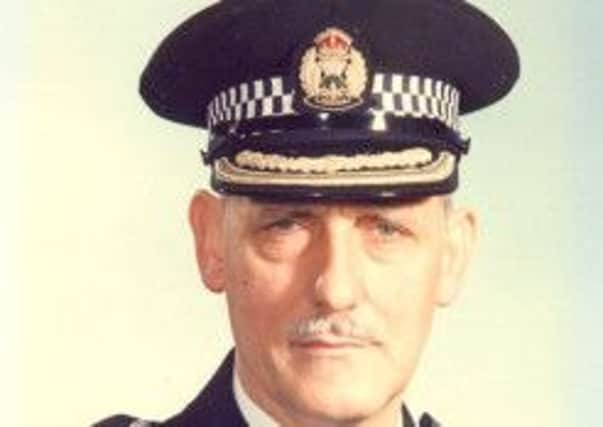Obituary: Chief Superintendent Albert Ridgway, police officer


Albert Ridgway was a police officer who was old-fashioned in that he had an unimpeachable integrity, but also modern because he was willing to embrace pioneering police methods.
Renowned as a tough but fair divisional commander, Ridgway rose from the ranks to end his career in charge of policing the west side of Edinburgh from Torphichen Place police station, the very station from where he set out to do points duty at Haymarket when he was a young constable.
Advertisement
Hide AdAdvertisement
Hide AdBorn the elder son of Hector, an electrical fitter, and Elizabeth, née Nixon, Ridgway was educated at Balgreen Primary School and Boroughmuir High School. He often stayed with his grandmother who ran a lodging house for policemen, and those lodgers made a big impression on him.
On leaving school he became an apprentice electrical engineer, before joining the Royal Air Force at the age of 18. He trained as a navigator and was posted to 31 Squadron, seeing wartime service mostly in the Far East with Transport Command.
He was barely 20 when he and his colleagues in the Goldstars, as 31 Squadron is nicknamed, performed heroics aboard unarmed Dakota aircraft, evacuating seriously wounded men from the frontline in Burma to hospitals in India.
Like so many veterans, Ridgway did not discuss his wartime service with his family, and only in recent months revealed his upset at seeing so many young men bearing terrible wounds.
Returning to Edinburgh on demob, he joined the city police in 1947, the same year that he met Janet Allison, always known as Jan.
At their first encounter in the West End Café, Jan thought he “wasn’t my type”, but the tall and handsome policeman overcame her doubts. They married in the Highland Tolbooth church in October 1952, and enjoyed more than 61 years of a happy and loving marriage, living mostly in Corstorphine.
A keen sportsman, Ridgway was a noted sprinter in his youth, and also played rugby and boxed. He remained a very fit man almost to the end of his life. He and Jan attended a local gym three times a week until a few months before his death.
He was always a dapper man. He was reserved by nature, had an enquiring mind and enjoyed good food – he became a superb cook.
Advertisement
Hide AdAdvertisement
Hide AdHis hobbies included calligraphy, photography and art (some of his watercolours are of a particularly high standard). He also bred dogs, with a particular love for red setters.
A talented jazz trumpeter, Ridgway was also a dedicated Burnsian, able to recite Tam O’Shanter from memory, which made him a welcome speaker at many a Burns Supper. In short he was a true “lad o’ pairts.”
His police career was exemplary. Ridgway steadily rose through the ranks from constable on the beat to chief inspector in charge of licensing in Edinburgh.
He thrived in this role, being proactive, for example, in teaching licensees from immigrant communities about the law. Like many police officers, he also welcomed the Clayson Report that liberalised Scottish licensing hours in 1976, as he had personal experience of the chaos caused by drinkers swilling down multiple drinks before the old 10pm curfew.
Ridgway was one of the first senior police officers to talk of understanding alcohol as a drug, but he also had very strong views against teenage drinking and those who supplied alcohol to youngsters.
One of his jobs in those far-off, much-censored, days was to visit Fringe shows in plainclothes to ensure that references to sex were tasteful, which gave him a fund of stories. His wry sense of humour showed when a Church of Scotland minister asked him what he did on Sundays. “Locking up prostitutes,” came the reply, “especially during the General Assembly.”
After Lothian and Borders Police was formed in 1975, Ridgway was promoted to superintendent and then chief superintendent at Torphichen Place, which made him responsible for policing the crowds at Murrayfield and Tynecastle.
It was at the latter stadium that he insisted on the introduction of closed circuit television, the first time it had been used in Scottish football.
Advertisement
Hide AdAdvertisement
Hide AdHe had seen a demonstration of CCTV in England and immediately realised its benefits for crowd control.
A frequent guest lecturer at Tulliallan Police College, Ridgway took charge of policing the visit to Edinburgh of Pope John Paul II in 1982, for which he received a Papal Medal.
It tickled him that the medal is preserved alongside his Masonic regalia.
He suffered a heart attack in 1982 and retired in 1984, which gave him more time to indulge his love of travelling.
Ridgway faced his final illnesses with indomitable courage, beating cancer of the parotid gland at the age of 88 before succumbing to post-operative infections, a stroke and pneumonia.
Doctors at St John’s Hospital in Livingston were astounded at his physical strength and his ability to battle back from the brink of death on several occasions, but when the inevitable end came it was peaceful.
He is survived by Jan, his daughter Deborah Kim, my partner, and grandson Lewis Ridgway MacDonald.
Albert Ridgway’s funeral service will take place at Warriston Crematorium on Monday, 23 December at 2pm, to which all friends and former colleagues are invited.